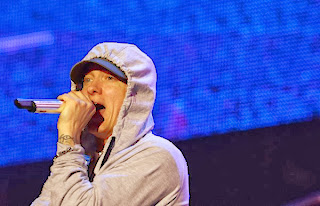Eminem Grows Older, but Not Up
We have watched Eminem age, all of us, difficult as it has been. We’ve seen him lash out at his mother, his then-wife, and his fans. We’ve seen him soften ever so slightly under the weight of fatherhood. We’ve seen him court protest, then express befuddlement over the hubbub. We’ve seen him retreat into drugs, and then climb out of the morass.
We have watched Eminem age, all of us, difficult as it has been. We’ve seen him lash out at his mother, his then-wife, and his fans. We’ve seen him soften ever so slightly under the weight of fatherhood. We’ve seen him court protest, then express befuddlement over the hubbub. We’ve seen him retreat into drugs, and then climb out of the morass.
Despite all this, we have barely seen Eminem grow up. His preoccupations
are largely fixed, his toolbox constant. He has almost certainly been
the greatest technician working in hip-hop over the last decade and a
half, but those skills — an outrageous command of language, a gift for
harrowing storytelling — are often put in service of the familiar.
Eminem is 41 now and still staring down the same barrels of old on “The
Marshall Mathers LP 2” (Aftermath/Shady/Interscope), his relentless,
demanding and often convincing seventh major-label album. Notionally
it’s a sequel to his second major-label album, from 2000, which has sold
more than 10 million copies in this country and remains one of his
indelible pop masterpieces. But really he’s been staying the same course
for years.
The themes here are the usual — the persistent disapproval of his mother
(“Brainless”), the absence of his father (“Rhyme or Reason”), the lack
of trustworthiness of the women he invites into his life (“So Much
Better”). From the beginning, his pure essence has been puerility, and
much of this album, for better and worse, finds him frozen.
What this album does differently, in places, is attempt to sew up old
wounds. Part of “Bad Guy” is written as a revenge fantasy from the
perspective of Matthew, the younger brother of the rabid fan in “Stan,”
one of Eminem’s most affecting songs. The moving “Headlights” is
Eminem’s apology to his mother for years of verbal abuse, his plea for a
united, or at least less dysfunctional, family.
On one song with a vulgar title, he rewrites the story of his ascent
with an overlay of regret: “Came to the world at a time when it was in
need of a villain,” he raps, continuing:
That role think I succeeded fulfilling
But don’t think I ever stopped to think that I was speaking to children
Everything was happening so fast it was like I blinked, sold three million
Then it all went blank.
He has regrets, then, which is reassuring in a way. But like most
savants, Eminem is interested in pyrotechnics above all else — “Rap God”
and “Berzerk,” especially, are overwhelming barrages of rhyme. His
lyrics are best viewed under a microscope — to see how each syllable
functions not only in its own line, but how it plays with the ones just
before and after, to emphasize the persistent double-entendres and the
unending assonance, to see how he gets from one rhyme to the next in
unexpected ways.
Because of that, often the music he’s rapping to barely matters — he’ll
dominate almost any sound. Over the course of his career, he’s succeeded
most when his production is either whimsical, on his earliest hits, or
dolorous, on his latest. Both styles appear here.
Rihanna rescues him again on “The Monster” — her blank power elevates
his scratchy ramblings, and the melancholy piano on “Legacy” seems to
calm him a bit. On “Love Game,” he uses a Wayne Fontana & the
Mindbenders sample the way the Native Tongues might have, for a dose of
oddity, while on “So Far...,” he’s rapping over Joe Walsh’s “Life’s Been
Good” for a track that, were it not for all the bleeping it would need,
could be easily played on Country Music Television.
Those songs are only a reminder that Eminem has never settled on a
musical aesthetic, only a strategy of rhyme. “Brainless,” which could
have been played on “The Dr. Demento Show,” is immediately followed here
by “Stronger Than I Was,” which is a virtually unlistenable
agglomeration of shrieks and atonal singing, the rare moment where
Eminem’s rage outright trumps his dexterity.
The only signs of maturity he’s showing are the flickers of self-doubt
that pepper this album. He frets about not having his old pop culture
subjects to rap about — “I’m frustrated ’cause ain’t/no more ’NSync, Now
I’m all out of whack/I’m all outta Backstreet Boys to call out and
attack” — or not being as in touch as he once was. He stresses over
having to find music on the Internet.
But he still has some old bad habits, still heavy-handed with the
homophobic slurs, and still explaining them away in interviews by
equating his current creative frame of mind to that of his less
enlightened battle-rapping days, a weak and tiresome excuse. He still
excels at baleful and downright mean records. Unlike, say, Jay Z, who’s
found new subject matter and new targets as he’s aged, Eminem is still
rapping from deep inside his cave, as if he’s had no new experiences to
draw from.
That is, though, just a form of self-protection. After the drug phase
documented on “Relapse” and the overcoming of it captured on “Recovery” —
his last two albums — Eminem may well be done putting himself in the
spotlight. He still lives in his hometown, Detroit. His daughter was just crowned homecoming queen. He undoubtedly has new wounds — we just may never get to hear about them.


Comments
Post a Comment